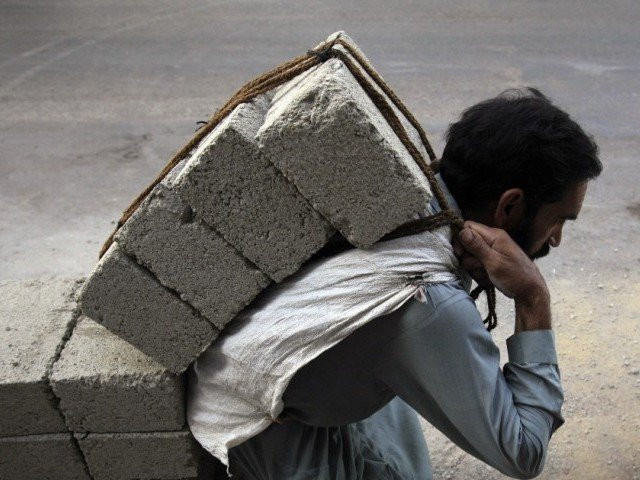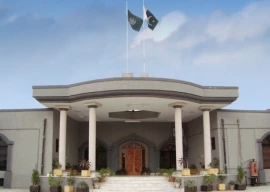
As a country we gained independence nearly 74 years ago but there are many of us who are not yet free.
It was in 2016 that the Sindh Assembly passed The Sindh Bonded Labour System (Abolition) Act 2015 and five years down the line, the law still awaits implementation.
Thousands of peasants remain entrenched in servitude under bonded labour and the provincial government has yet to form 'vigilance committees' in all districts to ensure their freedom.
Under the law, the bonded labour system refers to forced or partly forced labour, whereby individuals and their families are compelled to work without pay to pay off their debts. It is mostly peasants and brick kiln workers, who fall prey to such agreements with rich creditors. What starts off as a small loan can leave generations of a family trapped into bonded labour.
"Out of 29 districts of Sindh, only 12 [have] committees constituted thus far. These too are not working properly. A fund was also established for the rehabilitation of freed bonded labourers but it is not utilised," said Akram Khaskheli, president of the Hari Welfare Association - an organisation working for the rights of peasants in Sindh.
The law
Speaking to The Express Tribune, Khaskheli was referring to vigilance committees, which were to be established at district level across Sindh. Under the law, these committees were to comprise elected representatives of the area, representatives of the district administration and representatives of bar associations, the media, recognised social service bodies and the Sindh labour department. They were meant to ensure implementation of the 2016 law and help rehabilitate freed labourers.
Read more: Activists raise alarm over rise in bonded labour in Sindh
"On the commencement of this law, the bonded labour system shall stand abolished and every bonded labourer shall stand freed and discharged from any obligation to render his services forcibly. No person shall make any advance under, or in pursuance of, the bonded labour system or compel any person to render any bonded labour or other form of forced labour," reads one of the clauses of the law. It specifies that any such agreement, whether entered into before or after this legislation, would be rendered void and inoperative.
"Every bonded labourer who has been detained in civil prison, whether before or after judgement, shall be released from detention forthwith," the law reiterates.
It further lays out a penalty of a prison term not less than two years and not more than fine years or a fine of Rs100,000 or both for any individual who enforces bonded labour on any individual under any custom, tradition or agreement.
On ground
And yet, research carried out by the HWA revealed that despite the enactment of the law, the practice of bonded labour prevails in various districts of the province. Bonded labour, or modern slavery, is especially common in lower Sindh, including Badin, Sanghar, Tando Allahyar, Mirpurkhas, Umerkot, Shaheed Benazirabad and Hyderabad districts.
"More than 3,000 cases have been reported in 2020 alone as compared to 1,700 cases in 2019," said Khaskheli, quoting the findings of the research. According to him, the government's role appears to be negligible in ensuring the release of individuals and families trapped in bonded labour by influential landlords. Between 2013 to 2019 only 5,639 individuals were released from this practice, he added. In all of these cases, the police had raided the lands of such influentials on judicial orders and produced family members trapped in bondage before the court.
Apparent impunity
However, peasants rights activist Shujahuddin Qureshi, who works with the Pakistan Institute of Labour Education and Research (PILER) noted that not a single case of bonded labour was registered nor was any landlord involved in this practice arrested. "The people who bore the brunt of bonded labour were released under the habeas corpus petitions filed by [either their] relatives or by representatives of human rights groups."
Similarly, advocate Sarwon Kumar, who has pleaded cases of bonded labour before the courts, said that brick kiln owners frequently hold workers hostage in their quarters till their debts are not cleared. He added that after judicial orders he and his associates were able to have over a dozen bonded labourers released in Mirpurkhas recently. "The watchmen of the brick kiln would not allow the workers outside fearing their escape," he said, adding that the past few years have seen an increase of this practice. "Most cases are not [even] reported," said Kumar. Nothing will change till the law against bonded labour is implemented in letter and spirit, he remarked.
Awaiting implementation
Meanwhile, officials in the Sindh government apprised that the International Labour Organisation (ILO) had asked the provincial government a while ago to provide details of cases lodged under the law passed in 2016. The ILO had also sought a report pertaining to trials and prosecutions. But the Sindh government has yet to make any such data public.
Speaking to The Express Tribune, special assistant to the chief minister on human rights, Veerji Kolhi, claimed that incidents of bonded labour have decreased in the past five to eight years. "We are in a social media boom, where no case can be hidden. It is [mere] speculation [to say] that bonded labour is increasing."
Crediting the Sindh government for the 2016 legislation, Kolhi claimed that vigilance committees have been formed in some districts and efforts are underway to constitute them in the remaining districts. The old law was amended in 2015 to empower judicial magistrates in such cases, he said. "We accept that there is an issue with regard to implementation of the law, but we have now expedited the exercise to enforce it as soon as possible."
Published in The Express Tribune, July 2nd, 2021.





















COMMENTS
Comments are moderated and generally will be posted if they are on-topic and not abusive.
For more information, please see our Comments FAQ